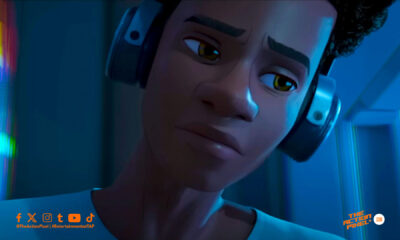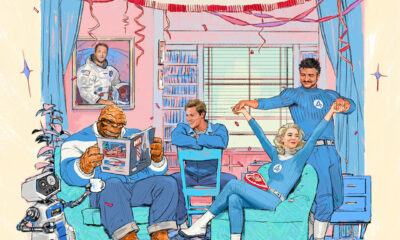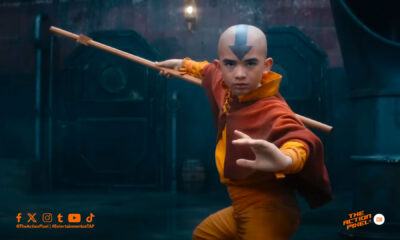Comics
“Jessica Jones”: A Sleeve of Hearts
Published
8 years agoon
Marvel, without a doubt, is good at what it does. Sculpting brands and narratives that are connected. This takes foresight, or at least some last minute creative shuffling. But with the recent reveals of the likes of Ant-Man and The Wasp, Marvel’s recent endeavours (the cinematic ones anyway, seem to be forcing a few puzzle pieces together that do not necessarily fit to appeal to the conveyor belt in Marvel Studio HQ that must always be churning out productions.
![]() It is however in the Marvel TV-verse that things seem to be allowed to age at a more natural rate. We really got to appreciate this with Netflix’s Daredevil. It was bloody without being so. The ambitious long tracking shots were a hit and miss in some places, but was not unsettling to the point of flipping over to re-watch the whole season of Firefly. Then Marvel + Netflix conspired to bring us Jessica Jones. Who by all appearances, both in the comic and in the preliminary teaser trailers and posters was not anything special. I mean she was a loser; she failed at being a superhero (even with a stripper’s name like Jewel), she’s dickheaded, brutish, seemingly apathetic and an all-round a-hole. And like that, Marvel, for the first time in my opinion, has crafted a series that comes close to the revered human element that comic TV series, save for The Walking Dead, have yet to fully tap into.
It is however in the Marvel TV-verse that things seem to be allowed to age at a more natural rate. We really got to appreciate this with Netflix’s Daredevil. It was bloody without being so. The ambitious long tracking shots were a hit and miss in some places, but was not unsettling to the point of flipping over to re-watch the whole season of Firefly. Then Marvel + Netflix conspired to bring us Jessica Jones. Who by all appearances, both in the comic and in the preliminary teaser trailers and posters was not anything special. I mean she was a loser; she failed at being a superhero (even with a stripper’s name like Jewel), she’s dickheaded, brutish, seemingly apathetic and an all-round a-hole. And like that, Marvel, for the first time in my opinion, has crafted a series that comes close to the revered human element that comic TV series, save for The Walking Dead, have yet to fully tap into.
![]()
I know what you are thinking. Daredevil had his moments of discernment that sent chills down your spine. Murdock’s interactions with Father Lantom, debating about the necessities of evil and the Thanatos which had Murdock teeter-totter between vigilante seeking justice and a blight of sanguine rage. But even with his fighting ability, being technically ‘blind’ and prone to life-threatening injury… Murdock comes across still less vulnerable than Jessica Jones, or more vulnerable in an unexpected way. And in there lies the differences between these two awesome Netflix + Marvel series. Daredevil speaks to our dark selves. Jessica Jones speaks to doubts and fears of vulnerability. And the show employs neat little devices to speak to this theme and in turn makes her arguably the most relatable hero to audiences.
“Birch Street, Higgins Drive, Cobalt Lane…”: Safety in Regression
Jessica is the embodiment of determination coming face-to-face with an overwhelming sense of vulnerability. Her past manipulation by Kilgrave (David Tennant) has left its mark on her life, and we see this from the very beginning; she doesn’t get attached, a distant cynic who works late, sleeps later and numbs thought with liquor. She’s running in a sense, from her self and her past. But that doesn’t stop her from experiencing “flashbacks”, sillage from Kilgrave’s mental manipulation (which turns out to be possible via a virus he emits) leads her to withdraw from the world.
Jessica’s only respite comes from her repeating a mantra to herself to bring her back to a happier, or, at least, a familiar time where she was in control. Names of streets a block over that lead to her childhood home. A place that was not free from abuse and trauma, but was a home nevertheless, the most stable Jessica has ever been.
So when Jessica feels these ‘panic attacks’ she regresses, retraces her steps, block-by-block, street-by-street, to find home. At first we think she’s trying to remember directions to a valuable location, as if not to forget. But her methodic calling of the streets’ names leading to her childhood home was not in an effort to remember where she lived, but rather to visualise it. A coping mechanism taught to her by the psychiatrist she characterised as a’ quack’ to counteract the psychological scars of Kilgrave’s telepathic control.
Dealing with Domestic Abuse
When you watch documentaries and Lifetime-esque shows of women caught in abusive relationships, it usually surrounds a female character escaping the clutches of a demented, controlling husband or lover, only to be pursued by him and have their very lives under threat of destruction or, worse, face the trauma of being forced them back into a toxic relationship. And as you binge-watch the Jessica Jones series, the similarities between the Kilgrave/Jessica Jones/abusive-relationship dynamic should not be lost on you. Jessica’s lifestyle is indicative of a woman on the run from something. She lives where she works, a bit of a dump and medicates her problems with alcohol.
But the traumatic scars get reopened, or should we say have salt dashed in them, when she comes to realise her tormentor Kilgrave is very well alive after their last encounter. And what ensues is a series of events that Kilgrave orchestrates to get Jessica’s attention, causing real collateral damage which climaxes to a standoff in a police station. Does Kilgrave want her dead? No. So why all the torture and manipulation of people around Jessica? So he could, get this, profess his undying love for her. He believes they are kindred spirits given the powers they possess. And as if in an act to totally sully Jessica’s one good memory, Kilgrave buys her old home, the one ‘safe’ place she had left in the world, even as her mind still reeled from the psychological trauma exerted on her through Kilgrave’s mind-fucking powers. He does this as a gift to Jessica; that which Kilgrave does not control through the mental and physical, he controls with gifts, money and other token reinforcements. Classic tactics of an abusive tormentor and the type of thing a lab rat would learn having been forced to take part in those experiments as a kid.
Particularly one dynamic ignored by many, including the Lifetime-fanbase is domestic violence among women, which can be just as brutal as with heterosexual couples. Episode 10 “AKA 1000 cuts” where Jeri gets viciously attacked by her partner was particularly gruesome. And yeah she was under Kilgrave’s mental control, but it still was ‘striking’ to say the least and is an issue that doesn’t get shown in films much due to, my guess, being some sort of gender bias. And part of the charm, to which Kilgrave hints at, is whether his ability to make someone do unspeakable things would even be possible if the victim didn’t have the mental capacity or desire to do that evil deed in the first place.
But the commendable thing is how Jessica deals with her tormentor. Fear is ever real and present. And it does at moments control if or how fast she reacts. But she is not deterred. There is always the compelling need for Jessica to make things right again and keep the people she cares about safe.
Sex Tools
One thing that did catch me a bit off guard in Jessica Jones was the sex scenes. Not that they were over the top raunchy, but they weren’t exactly tame or sanitised either. A few springs and bedheads were damaged, but pass all the hot-breath panting and sweat is an act of control. Like Frank Underwood from the House Of Cards (another sexy little Netflix series) said:
Everything is about sex except sex. Sex is about power.
For Jessica’s adoptive sister Trish Walker (Rachael Tayler), she seeks control via sexual conquest over cop Will Simpson (Wil Traval) after her perceived shortcomings in the attempted kidnapping of Kilgrave. We also see early on due to abuse from her mother in childhood, coupled with her celebrity status attracting stalkers, she lives in an apartment with the security features of a bank vault, and an obsessive determination she possesses in learning hardcore self-defence. Her tactic of dealing with vulnerability is taking issues head-on, forcefully. For the secretary of Jeri Hogarth (Carrie Moss) sex is used to galvanise Jeri’s vulnerability and provide the incentive for her being cold as she is calculative. Jessica sexual escapades, however, mask something deeper.
Jessica first sexual romp we see is not one of conquest, nor is it one of submission either. It rather shows that at the first sign of vulnerability, she will look to distance herself. When things get hot and heavy with Luke Cage (Mike Colter), there is a moment where they hold eye contact. Here we see Jessica cow eyes become wet, shifting, averting the soul-scouring gaze of Cage. Her answer? Doggystyle. Fun, sure, but less intimate. Less vulnerable. And this is how Jessica handles all her problems until Kilgrave’s final first act of manipulative savagery forces her to make the old Darwinian choice… flight or fight? Escape to a whole other country, or face her demon?
![]() Kilgrave’s sexual depravity may have been hinted at with the pregnancy of Hope Shlottman (Erin Moriarty), who was under his mind control, thus sex without consent, but the ugliness of it becomes all too real in Episode 8 “AKA WWJD” when Jessica confronts him with the word ‘rape’. It is what it is, and it did leave me slightly uneasy. Hell, even Kilgrave said he “hate[d] that word”. Wasn’t this supposed to be a hero movie? Yes. And it is. And the monsters in this world aren’t just aliens destroying Hell’s Kitchen during the extinction-level event aka the ‘Incident’ (Avengers shout-out there). It is ugly. Kilgrave is a rapist. And in his defence, Kilgrave tries to blame his deviancy on his traumatic childhood experiences (and they are traumatic, but nonetheless, a necessary trauma) and his brain chemistry. Sounds like an Law & Order: SVU episode, doesn’t it?
Kilgrave’s sexual depravity may have been hinted at with the pregnancy of Hope Shlottman (Erin Moriarty), who was under his mind control, thus sex without consent, but the ugliness of it becomes all too real in Episode 8 “AKA WWJD” when Jessica confronts him with the word ‘rape’. It is what it is, and it did leave me slightly uneasy. Hell, even Kilgrave said he “hate[d] that word”. Wasn’t this supposed to be a hero movie? Yes. And it is. And the monsters in this world aren’t just aliens destroying Hell’s Kitchen during the extinction-level event aka the ‘Incident’ (Avengers shout-out there). It is ugly. Kilgrave is a rapist. And in his defence, Kilgrave tries to blame his deviancy on his traumatic childhood experiences (and they are traumatic, but nonetheless, a necessary trauma) and his brain chemistry. Sounds like an Law & Order: SVU episode, doesn’t it?
And why do rapists rape? Control. And for Kilgrave it is because the act is an extension of his mind-altering powers. So whilst sex for everyone else in the series is used to escape some form of vulnerability and is shown with every writhing back and grinding loins, for Kilgrave, ‘sex’ is used as means of control via making his quarry vulnerable and to satisfy his own selfish needs. But this is kept in conversation, thankfully. It’s not Game Of Thrones after all.
And its not just sex when it comes to intimacy.There is also sibling love between Jessica and adopted sister Trish, which is actually the centre ‘love story’ of the series. Which is definitely a one up to the man-woman love stories saturating hero-motivated Hollywood narratives. Calm down feminists, we hear you clapping ever so energetically.
Vulnerability Spectrum
Jessica has a lot to lose. Love. Life. Friends. Peace of mind. Piece of mind. And to an extent the extremes of her vulnerability are measured by the people around her, Kilgrave and Luke Cage being the respective polar opposites. Kilgrave threatens her sanity while Cage makes her more emotionally-open, which in turn makes her more vulnerable to attack. And when Luke finds out Jessica was involved in his wife’s death, (something Jessica divulges to save the life of a bus driver Luke thought killed her), Luke realises how much his relationship with Jessica left him thinking that there was a life looking forward to after his wife’s death. Jessica’s tears were enough to expose her for the Cage’s words that would ultimately crush her:
I was wrong. You are a piece of shit
But it’s not just Jessica whose vulnerability leaves her open for hurt and pain. Cage uses sexcapades as well, which ultimately give insight into the vulnerabilities of the invulnerable man. His relationships until finding out Jessica had ‘powers’ like him, was bereft of any attachments that came with ‘drama’. Kilgrave himself is vulnerable, not just when sedated. His jealous rages and manipulation of others is Kilgrave’s attempt to gain the fair hand and attention of Jessica, all to thwart the negative feelings of rejection and loneliness that comes with it. And rejection, for a man whose every need is granted on a whim, leaves him with an unquenchable yearning for something he can’t have. And where a need is as intense as fear, love, anger or sorrow, we begin to realise that this is only the various garbs of vulnerability.
Jeph Loeb said Jessica Jones in the Netflix Original was an ‘extremely relatable’ and ‘very aspirational’ character. And Krysten Ritter plays her part very well. As for the future of Marvel on the TV screen, a very nice precedent has been added on to the Netflix roster, hopefully leading to an even more emotional as well action-packed enthralling piece of narrative come Luke Cage, Iron Fist and ultimately The Defenders. Jessica Jones hits most of the tick boxes, and whilst powers are secondary in this film and the subtlety of how said powers look or are represented on screen, play to the background of character and narrative development. But I think for some of us, w got more giddy to Murdock’s “It’s like the world is on fire” than Kilgrave’s purple-flashing strobe fancy edits.
![]() Nevertheless there is real emotion in this series, and despite Jones tough leather jacket enforcer exterior, she proves the harder the shell, the softer the centre. But seriously, she’s one tough cookie, so I wouldn’t go prodding for a ‘weakness’. A fine adaptation of, surprisingly Marvel’s first major film narrative which the portrayal of the everyday superwoman isn’t a footnote (Sorry Black Widow). The series isn’t the perfect series of ever, but it is bereft of any of those cringe worthy moments you’d get from… I don’t know, a certain DC blonde with a hope symbol pinned on her chest…
Nevertheless there is real emotion in this series, and despite Jones tough leather jacket enforcer exterior, she proves the harder the shell, the softer the centre. But seriously, she’s one tough cookie, so I wouldn’t go prodding for a ‘weakness’. A fine adaptation of, surprisingly Marvel’s first major film narrative which the portrayal of the everyday superwoman isn’t a footnote (Sorry Black Widow). The series isn’t the perfect series of ever, but it is bereft of any of those cringe worthy moments you’d get from… I don’t know, a certain DC blonde with a hope symbol pinned on her chest…
We just honestly hope some of this new found Marvel heart translates to bigger blockbusters come Marvel’s Phase 3. Cap, you’re up.
Blogger, comic book and anime fan. FPS addict. All very convenient. Known to do storyboards and motion graphics when he's really busy.
You may like
-


The Spider-Verse expands as Miles faces his greatest enemy yet in the animation short “The Spider Within”
-


Marvel Studios’ announces full main cast and release date for “The Fantastic Four” movie
-


Aang steps into his destiny in the Netflix trailer for “Avatar: The Last Airbender”
-


“Avatar: The Last Airbender” stands against the tide in new poster
-


Netflix’s “Avatar: The Last Airbender” live-action series calls for the mastery of all elements in new character posters
-


Sony’s “Madame Web” movie posters reveal an ever-intricate web of possibility